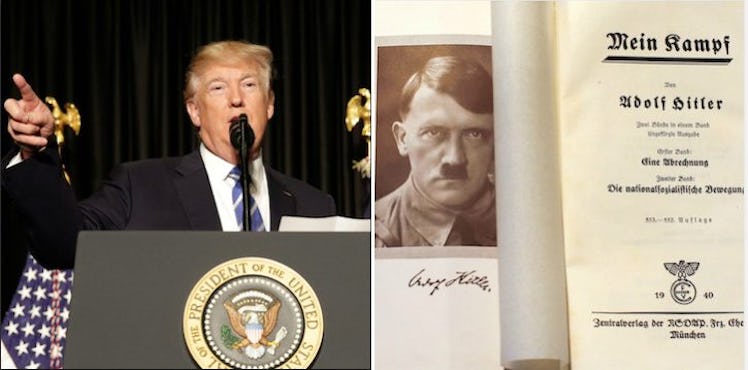
All The Scary Similarities In Trump's And Hitler's Rises, From A Nazi Expert
One of the world's leading experts on Nazis, Ron Rosenbaum, just compared President Donald Trump to Adolf Hitler
Rosenbaum was reluctant to make the comparison up to this point, as he didn't want to trivialize the atrocities Hitler committed.
But now that Trump is officially president, the author is speaking out.
He said,
Now Trump and his minions are in the driver's seat, attempting to pose as respectable participants in American politics, when their views come out of a playbook written in German. Now is the time for a much closer inspection of the tactics and strategy that brought off this spectacular distortion of American values.
In an article for the Los Angeles Review of Books, Rosenbaum outlined how Trump's rise to power was quite similar to that of Hitler.
Rosenbaum argues Trump is using Hitler's playbook, and the playbook is "Mein Kampf."
1. Hitler was a habitual liar. So is Trump.
As Rosenbaum put it,
Hitler's method was to lie until he got what he wanted, by which point it was too late.
Comparatively, he said,
Trump's outrageous conduct and shamelessly lying mouth seemed so ridiculous we wouldn't have to take him seriously. Until we did.
Both men lowered the bar for what's acceptable in massive ways, allowing them to get away with things no one else would dare attempt.
2. Trump bluffed his way into power, just like Hitler.
In Rosenbaum's view, Hitler and Trump both bluffed their way into power.
Hitler's method was to lie until he got what he wanted.
By confusing the systems they sought to control, Trump and Hitler successfully gained power.
He said,
Hitler used the tactics of bluff masterfully, at times giving the impression of being a feckless Chaplinesque clown, at other times a sleeping serpent, at others yet a trustworthy statesman. The Weimar establishment didn't know what to do, so they pretended this was normal. They 'normalized' him.
Similarly, Trump's erratic behavior often left the media and political establishment completely dumfounded. In the process, he was normalized as well.
Rosenbaum said,
We didn't take [Trump] seriously because of all the outrageous, clownish acts and gaffes we thought would cause him to drop out of the race. Except these gaffes were designed to distract. This was his secret strategy, the essence of his success — you can't take a stand against Trump because you don't know where Trump is standing. You can't find him guilty of evil, you can't find him at all. And the tactics worked. Trump was not taken seriously, which allowed him to slip by the normal standards for an American candidate. The mountebank won. Again.
Mountebank is another way of saying "con artist."
3. Both men eroded the public's trust in the media via repetitive attacks.
In his article, Rosenbaum placed particular emphasis on Hitler's attacks on the newspaper that continuously investigated him and sought to expose his true nature, the Munich Post.
The truth is always worth knowing.
There are clear parallels between Trump's attack on the media in the present day, especially the New York Times.
Rosenbaum warned that the media must continue to fight Trump, and avoid normalizing him at all costs.
The Munich Post lost its fight against Hitler, but it set an important example. As he says,
The Munich Post resisted. The Munich Post lost, yes. Soon their office was closed. Some of the journalists ended up in Dachau, some 'disappeared.' But they'd won a victory for truth. A victory over normalization. They never stopped fighting the lies, big and small, and left a record of defiance that was heroic and inspirational. They discovered the truth about 'endlösung' [the Final Solution] before most could have even imagined it. The truth is always worth knowing. Support your local journalist.
Long story short, the media can't normalize Trump.
It has to continue to fight for the truth, no matter how hard Trump attempts to discredit it.
When Trump screams "FAKE NEWS," the media has to scream the truth even louder.
Citations: Against Normalization: The Lesson of the “Munich Post” (Los Angeles Review of Books)